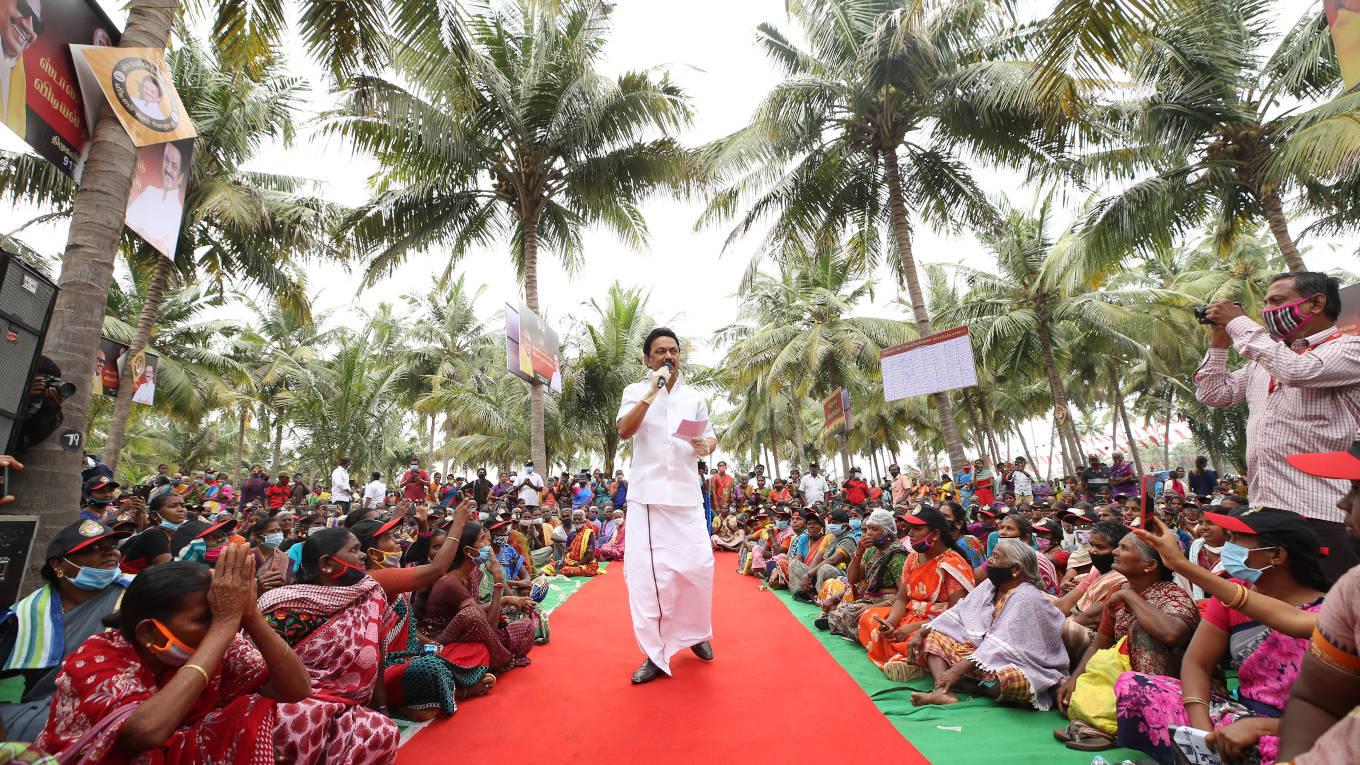-
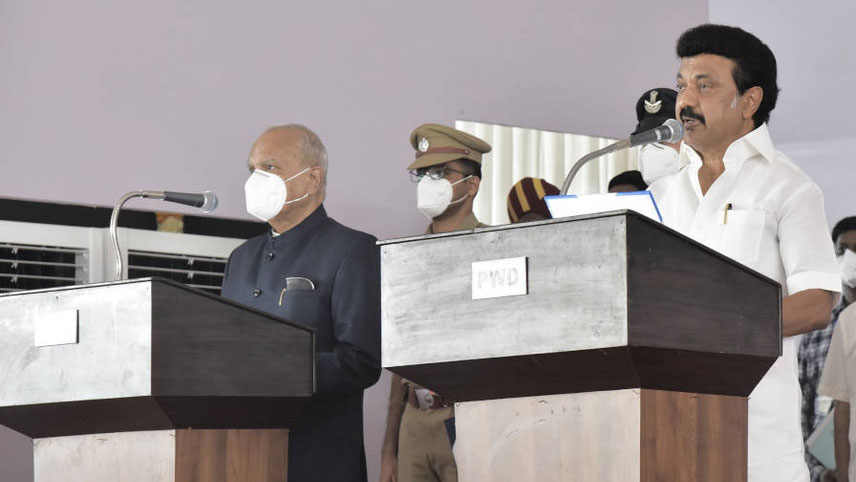
Stalin promised ‘absolute transparency’ in governance
To cut a long story short, EPS went far. He renewed poll accord with the BJP and a few other usual AIADMK allies, negotiated hard on seat-sharing and ‘inspired’ reports that there’s no anti-incumbency factor to hurt his return to rule. It simply didn’t work out as people had already made up their minds desiring a ‘change’. The ruling party managed to win only 66 of the 191 seats it contested while allies BJP and PMK got four and five respectively. Stalin’s DMK, on the other hand, won 133 seats out of the 188 it contested while the alliance that included the Congress (18), VCK (4), CPM (2) and CPI (2) made up an impressive score of 159 of the total 234 in the Assembly. ‘Tamil Nadu has now announced DMK’s victory; the state will win hereafter’, was his first response to the poll win.
He went on to promise “absolute transparency” in governance, urgent measures to tackle the worsening Covid crisis and the state’s financial health, besides setting up an exclusive office to ensure that the public petitions to him are disposed in 100 days under a new initiative he named, ‘CM in your constituency’ – a take-off from the mammoth meet-the-public march he had done during the election campaign receiving petitions across the state in a pet project he flagged as ‘Stalin in your constituency’. It is said there are close to two million petitions already in the queue for disposal by a sprightly IAS officer assigned the task and working directly under CM Stalin.
All those many gruelling roadshows through the nooks and corners of Tamil Nadu were only part of the painstaking efforts Stalin had taken over the years to strengthen the DMK, starting with canvassing votes as a puny teenager for uncle Murasoli Maran’s bid for the South Madras (now Chennai) Lok Sabha seat. He was then captaining a local boys’ group that helped the DMK in small ways when not playing cricket at the Gopalapuram playfield close to his house. Stalin converted this outfit into the DMK Youth Wing that soon emerged as the party’s backbone, hugely helping papa Karunanidhi during public rallies, membership enrolment drives and election campaigns.
His detention under the MISA (1976) and the brutal beating in jail catapulted him to high prominence in the party. He became the DMK youth wing secretary in 1982 and remained at its helm for over four decades; became the MLA for the first time in 1989, the first elected mayor of Chennai (then Madras) in 1996 when he had nine flyovers built in the city to ease its traffic flow and also initiated his pet mission named ‘Singara Chennai’ to beautify the capital.
Stalin was inducted as minister in Karunanidhi’s cabinet in 2006 and was made the Deputy CM a couple of years later. He became the party treasurer in 2008 and though his father named him as his political successor way back in 2013 (Jan 3), never once did he show any sign of being in a hurry to take over the reins.
In his father’s shadow
Stalin became the party’s ‘working president’ months after Karunanidhi fell ill in October 2016 and took total charge only after his demise (7 August 2018). The DMK general council met later that month to formally elect him as the president, even as elder brother Alagiri continued his desperate and unsuccessful attempts to regain lost position in the party as its southern satrap headquartered at Madurai – Karunanidhi had him expelled for ‘anti-party activities’ in 2014 unable to bear his harsh hostility towards Stalin.
Priding himself to be ‘a journalist first and politician next’, Karunanidhi enjoyed holding press conferences at ‘Anna Arivalayam’, the party headquarters, whether in power or out of it – unlike Jayalalithaa who hated her rare media sessions. Scribes on the DMK ‘beat’ recall how Stalin would stand in one distant corner behind his father listening intently to his banter while dealing with even inconvenient questions.
“And to this day, Stalin would only refer to Kalaignar (means litterateur, a title given to Karunanidhi by his fans and party colleagues) as thalaivar (leader) and never as his father”, says ‘Arivalayam’ Sekar, a long-time reporter of DMK affairs. As long as Karunanidhi was around, Stalin would hardly ever oblige a scribe seeking his view on any issue. ‘Please ask thalaivar’, would be his standard response.
-
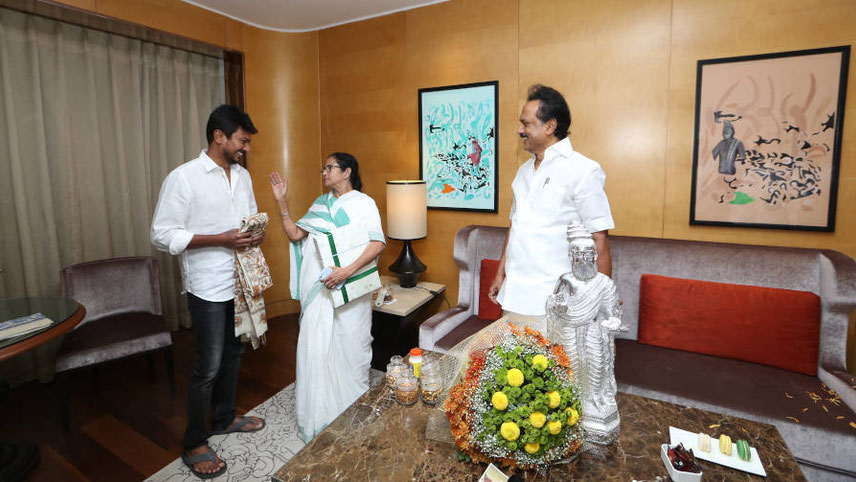
Mamata has some advice for Udayanidhi, while Stalin looks on
Also, Stalin’s speeches would be low-key if he shared the dais with his father who had his high-decibel go at the political rivals and monopolise the media headlines in the morning. Content staying in his shadows till the very end, Stalin remained a devout son and a great learner watching his thalaivar perform as a shrewd politician steering his party through crises of all sorts and keeping the flock together despite the many poll debacles.
And during his days as the minister and Deputy CM, he picked up from his school dropout dad the skills of choosing good bureaucrats to assist and to extract the best out of them by listening to their wise counsel rather than push through his own decisions. Equally important, father showed him the ways of clipping the wings and blunting the greed of some ‘ambitious’ ministers by posting IAS secretaries of impeccable integrity and competence in those departments, said a DMK senior requesting anonymity.
“Stalin worked really hard at his desk to ensure that the files were cleared quick even while having elaborate discussions with the officers to ensure decisions were made in accordance with the rules and in consonance with public good”, recalled Ashok Vardhan Shetty, who was an equally hardworking IAS officer heading the Rural Development and Panchayat Raj departments that came under Stalin’s charge.
And he had never allowed either his family members or party functionaries to interfere in government work, Shetty added, while listing out instances when his boss took decisions guided only by the state’s interests and steering away from any debilitating personal and party pressures. “There’s nothing to indicate, even remotely, he will not continue in the same transparent fashion now as the CM”, summed up Shetty, who took voluntary retirement after Jayalalithaa stormed to power in 2011.
As it turned out, Stalin lost no time in hoisting signals loud and clear that he was truly honest in his poll promise to deliver transparency in governance. The process in fact, began almost immediately after the poll day (6 April) as Stalin held discussions with trusted lieutenants and experts on finding solutions to the state’s critical problems – such as the Covid surge, the financial crisis and the crippling corruption – and identifying the officers best suited to deliver solutions. And when the election results came on 2 May, those formulating change processes began to roll out almost immediately.
Stalin’s ministers appear, speak and have begun working at a much higher plane when compared with those in the EPS team that had been handpicked by Jayalalithaa with active participation from live-in friend Sasikala Natarajan, based merely on slavish subservience. It was pathetic if not comical to watch men like Rajendra Balaji rant away things like, Puratchithalaivi (Jaya’s title, means revolutionary leader) was our Amma, Modi is our Appa (means father)’ and remained a meme-favourite forever. Many of them were ‘collection agents’ for the Poes Garden and graduated as ‘independent’ political entrepreneurs post-Jayalalithaa. It would be a 24x7 drill for the officers should Stalin keep his promise to have that regime’s corruption charges investigated.
A formidable team
The DMK ministers in the three most critical departments – finance, health and industry – were clearly the best pick in the treasury benches. Ditto about his choice of the state chief secretary, V. Irai Anbu, known for his personal integrity and administrative competence; the scholar-author-motivational speaker was justifiably promoted over 12 seniors for this tight-rope-walking over the turbulent bureaucratic waters.
Finance minister Palanivel Thiagarajan, has an engineering degree from the NIT-Trichy, a Masters in Operations Research and a Ph.D in Human Factors Engineering/Engineering Psychology at State University of New York and an MBA in Financial Management from the MIT Sloan School of Management. After being away abroad for two decades, he returned home in Madurai, where his family has been ‘real royalty’ for generations – grandfather P.T. Rajan was the Chief Minister of the Madras Presidency during 1936 and father PTR Palanivel Rajan was a DMK minister and Assembly Speaker – and decided to settle down for good with his American wife Margaret and two school-going sons, close to the family deity at the world-famous Madurai Meenakshiamman temple.
His last job was as the MD at the Standard Chartered Bank in Singapore and presently he is busy working on a white paper on the financial ‘mess’ of the predecessor regime so as to devise a robust plan to get Tamil Nadu out of the woods. And he looks confident when he says it’s a deliverable task by using “innovative measures” rather than sticking to the standard practices.
-
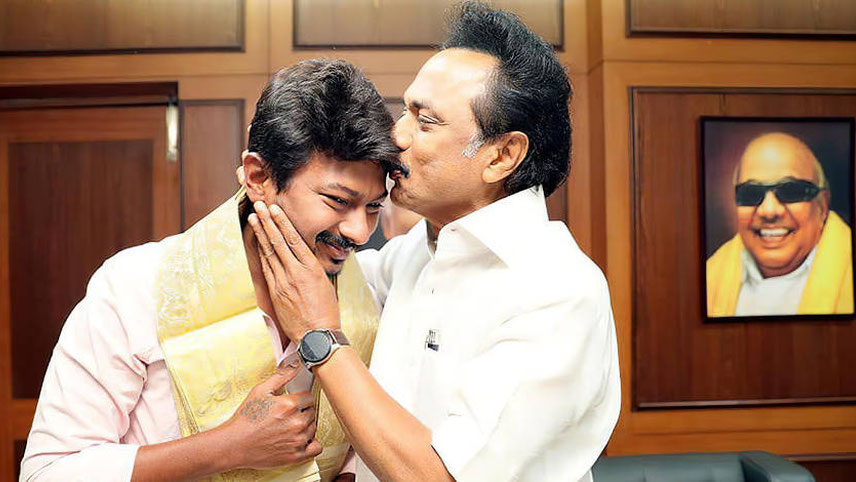
Udayanidhi: the third generation politico gets father Stalin’s blessings
Former Chennai mayor Ma. Subramanian is the new health minister. His successful handling of the multiple needs of the massive metropolis during the 2006-11 stint as the mayor, particularly the huge garbage-sewage disposal, running the many corporation health centres and schools for the poor, maintaining stormwater drains, street-lighting and roads, won MaSu, as he was popularly known, several hearts in the city. The marathon runner was also famous for presenting himself at the ‘spot’ within minutes of any public problem arising in the city.
And like his boss, he too is a willing listener while seeking guidance from the officials. “His experience in handling public health and hygiene issues and his warm image as a people’s mayor has endeared MaSu to the masses. After the usual morning run for an hour and a yoga session at home, he is ready for the tough day that might last over 16 hours. He is a workaholic”, says senior journalist C.S. Kotteswaran, who has been covering the city corporation for years.
“Chennai is now a Covid capital in the south and MaSu knows the city like the back of his palm having been its hyper-active mayor”, Kotteswaran adds.
Someone had placed his phone number on the social media and MaSu was inundated with distress calls from Covid-hit public across the state. “We changed his phone SIM and are now in the process of setting up an integrated SOS system”, said a close aide.
Attracting new investors
Apart from stepping up the testing and vaccination, besides strengthening the oxygen availability, the big challenge for the new health minister would be setting up large number of triage and oxygen centres with 10-100 bed capacity so as to reduce the pressure on the hospitals. “We are looking at this seriously as such multiple touch-points would be better than focussing only on setting up large 1,000-bedded treatment facilities”, said a government source.
Thangam Thennarasu was very popular with students, teachers and education administrators during his stint as the school education minister in the Karunanidhi government of 2006-11. Known for his commitment to deliver, the engineering graduate brought in reforms in school education, lightened the text books and ensured periodical revision of the syllabi. The poorly performing government schools showed significant pass percentage during his tenure. Now in his new role as the state’s industries minister, ‘Thangam’ (means gold) must shoulder huge responsibility to not just help the existing industries to function smoothly but also attract new investors to the state even while taking into account the present Covid crisis hitting the industries and business houses. The previous AIADMK regime had faltered badly on both counts thereby denting the state’s robust industrial culture.
When Nirmala Sitharaman during her tenure as the Defence Minister tried to get the Russian joint venture factory to make AK-47 rifles at Trichy, the Russians sought shifting of the venue to a safer state after showing her the huge number of public agitations targeting various production units in Tamil Nadu. The rifle factory moved to Amethi.
One such ‘inspired’ agitation led to the AIADMK government shutting down Sterlite Copper at Thoothukudi down south in May 2018, another rattler for prospective investors. Winding back on the clock a bit, the high corruption during the Jayalalithaa administration, when the industrialists/investors allegedly had to wait for months for an appointment and needed to pay big bribes, scared them away to better destinations. (See box: What the industry expects).
Stalin is expected to fly to Delhi in the next few days as the opening session to elect the Speaker and Deputy Speaker ended on Wednesday (12 May). He will call on Prime Minister Narendra Modi, Home Minister Amit Shah, Finance Minister Nirmala Sitharaman, Congress allies Sonia Gandhi and Rahul, apart from a few other leaders, according to informed sources. They said the budget session is likely to start soon after the present lockdown for Covid ends on 24 May and he would like to finish his capital appointments by then.
Stalin has one of the most qualified finance ministers in the country, with a rich experience in managing high finance. So, what are his options to have a functioning budget? Click to read
-
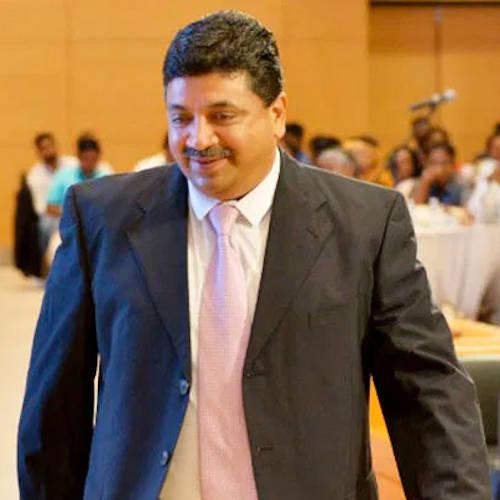
Thiagarajan: will he bring back the glorious days?
The usual ritual of a newly elected CM presenting bouquets of flowers along with petitions for help would have additional burden this time as Stalin must press for emergency aid to tackle the Covid spike and the financial crisis. It is expected that PM Modi and his colleagues will treat Stalin well and take his plea for help seriously as after all, Tamil Nadu is a major state and is facing genuine human tragedy.
Besides, at a political level, the BJP top brass cannot be seen as being hostile and insensitive towards the Dravidian state in dire straits down south, where the saffron vote share is just about 2.6 per cent. It is now an open secret that the BJP plans to make the neighbouring Puducherry as the springboard, by major infusion of infra investments to create all-round growth in the tiny Union Territory where it shares power with All-India NR-Congress, to woo the TN voters.
Stalin too is taking care not to ruffle the saffron feathers too much on the eve of his Delhi trip. Rather than commenting himself, he let the party general secretary Durai Murugan to issue a statement condemning as ‘undemocratic’ the Home Ministry naming three BJP members as the nominated members in the 30-member Puducherry Assembly thereby increasing its strength to 33 and plotting a “backdoor effort to capture power” when Chief Minister N Rangaswamy heading the All-India NR Congress is under Covid treatment in a Chennai hospital. The BJP with six MLAs is a coalition partner of AINRC that has 10 members and with the addition of the three nominated members, the saffron strength goes up to nine. There are six independent MLAs in the little House, so the Opposition’s anguish is understandable.
But then, Puducherry should be hardly on Stalin’s crowded radar at the moment and he is likely to do everything possible to stay on the safe side of the Central Government if only to get things done to mitigate the state’s misery in quick time. Similarly, political prudence, even if not the Constitutional responsibilities and humane considerations, must weigh upon the rulers in Delhi to respond positively.
-
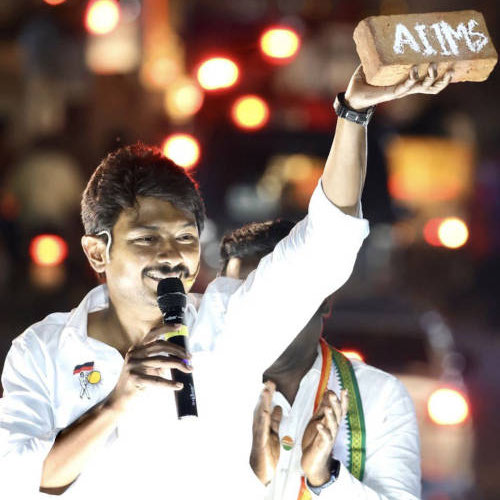
Udayanidhi with a brick written AIMS: taking potshots at the Centre
Another son rises
There is much talk about Stalin inducting his actor-son Udayanidhi into active DMK politics and giving him the Chepauk constituency close to the Marina, which was once represented by his father Karunanidhi. ‘Another son rising fast in the party of the Rising Sun (DMK symbol)’ has been the favourite media theme in recent months. However, the young man justified his father’s call by not only winning his seat by a margin of almost 70,000 votes, but also participating in the party’s electioneering across the state.
Udaya’s ‘brick drama’ scored the bull’s eye on national media, showing him holding up a brick and wanting to know where the rest of the AIIMS hospital, promised by the BJP government at the Centre, was. “I went looking for the promised AIIMS and this brick was all that I found at the site.” He then chuckled and the TV crews lapped that up. A BJP worker promptly filed a case accusing him of stealing the brick from the AIIMS construction site but that did not deter Udaya from carrying the ‘AIIMS brick’ throughout his campaign and finally presenting it to his father after the Chepauk victory was declared.
There was speculation that Stalin would make the first-time MLA a minister but that did not happen, at least not yet. But then, Udaya is already a major force in the DMK after taking charge of its all-important youth wing that was Stalin’s baby till the other day; and that would mean shouldering the big responsibility of building up the party’s next-gen, and perhaps spending less time at film studios.
Udaya is a fairly successful hero and his production house, Red Giant, has delivered some big hits. He is also the MD of the party organ ‘Murasoli’. And his bosom buddy Anbil Mahesh Poyyamozhi has been made a minister and given the important school education portfolio
-
The only silver lining in the whole murky situation is the Covid-induced economic shrinkage, with the Centre allowing the states to go in for more market borrowings to raise the permissible fiscal deficit limit of states to up to 4 per cent of their GSDP
TN finances: a bird’s eye view
Chief Minister MK Stalin is in an unenviable position on the state financial front, having inherited a virtually empty treasury from the outgoing AIADMK regime, except there is a lot more leeway now for the states to considerably step up their market borrowings.
The unprecedented Covid-19 pandemic, which forced a nationwide lockdown from 24 March last year, severely affected Tamil Nadu too, with most economic activities grinding to a halt and agriculture being the sole engine of growth. There was the added burden of having to spend hugely on medical infrastructure: the total expenditure on the Covid-19 pandemic response in Tamil Nadu was Rs13,353 crore.
Within the first few months of the pandemic, as a fallout of the lockdown, the state economy shrunk, freezing the ‘state’s own tax revenues’ (SOTR), like cash from mining leases, motor vehicle registrations, stamp duty collection, and so on. Only the primary sector, agriculture and allied activities like livestock and fisheries, gave some hope, growing at 5 per cent – an amazing feat by rural hands.
The Edappadi Palaniswami government had done a fairly good job in containing the spread of the pandemic, quickly appointing a high-power committee headed by the former RBI Governor, C Rangarajan, to suggest short-term and medium-term policy measures to bring TN back to the growth path, as the government started easing the lockdown restrictions in a calibrated manner.
The committee had projected a modest growth rate of just 2.02 per cent in 2020-21, given that the pandemic took centre stage. Among its key recommendations, the Rangarajan panel had urged the government to pump in at least Rs10,000 crore immediately as capital expenditure to help revive general employment and demand. The then finance minister, O Panneerselvam, dutifully did this by stepping up capital expenditure in the Interim Budget for 2021-22, the last one he presented before the general elections in February this year.
The state economy appeared to pick up, but has been again jammed by a second wave of the Covid-19, this time through a more rapidly spreading Indian mutant. The state finances now present a disturbing picture.
The macro scene is not encouraging as the 15th Finance Commission recommendations have come as a ‘severe disappointment’ for Tamil Nadu, as OPS himself put it in his last budget speech. The horizontal share of taxes for Tamil Nadu from the Centre has dropped to 4.079 per cent, against the 4.189 per cent recommended in the Commission’s interim report.
This has been a huge setback for the state on top of pending GST dues, non-clearance of various grants like for local bodies, and more crucially, a cut in revenue deficit grants for the state from Rs4,025 crore to Rs2,204 crore – that too only for one year, 2021-22. Though the Edappadi government, just before the polls, waived farmers’ crop loans to primary agriculture co-operatives to the tune of Rs12,110.74 crore, OPS could allocate only Rs5,000 crore on this count in the interim budget due to financial constraints. And this will now be an additional burden for Stalin.
OPS had also pointed out that the share of Central taxes to Tamil Nadu has been reduced by over Rs9,800 crore. All this has impacted both the revenue deficit and overall fiscal deficit of the state. For 2021-22, TN’s fiscal deficit has been estimated to be Rs84,202.39 crore, which is 3.94 per cent of the gross state domestic product (GSDP). The overall public debt of Tamil Nadu as on 31 March 2021, stands at a huge Rs4.85 lakh crore-plus. “I am worried about the interest on these loans,” says former Union Revenue Secretary MR Sivaraman.
The only silver lining in the whole murky situation is the Covid-induced economic shrinkage, with the Centre allowing the states to go in for more market borrowings to raise the permissible fiscal deficit limit of states to up to 4 per cent of their GSDP.
This is hardly a cushion for the new DMK government, which too has promised several concessions to the poorer and weaker sections, including free bus travel to women in urban areas, and Rs1,000 monthly allowance to all housewives. The new finance minister, Palanivel Thiagarajan, has said his first priority will be to get the numbers straight in a ‘White Paper’ on TN finances.
-
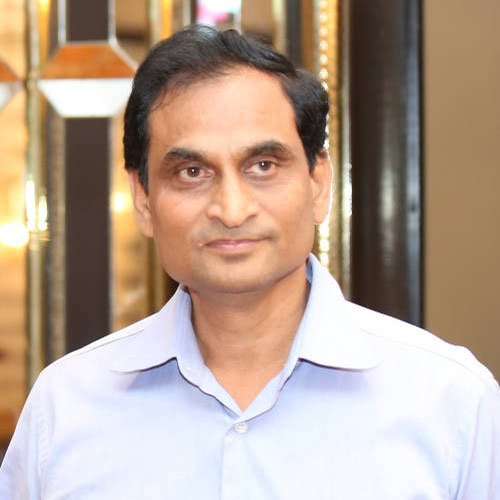
C.K. Ranganathan: focus on public health infrastructure
What the industry expects
G.S.K. Velu, chairman, FICCI Tamil Nadu state council & CMD, Trivitron group of companies, feels that the new government has taken over during challenging times for the society, economy and the industry. The industry representing most of the sectors, excluding a few, has been severely impacted from the onset of the pandemic and the restrictions that followed. The most affected have been the micro, small and medium enterprises that play a significant role in employment generation.
According to him, the government should support the MSMEs by offering interest and other statutory dues waivers to reduce their burden. It should also take measures to ensure adequate credit flow to the sector to help them survive the crisis. As a medium-to-long-term measure, the government must have a consultation with the industry in creating a vision document for the next decade and also for revisiting the already existing policies to make suitable changes based on the global developments, recent trends and the pandemic-imposed challenges.
The government should also focus on attracting more investments in the labour-intensive manufacturing sectors to generate more employment opportunities and should try to give more thrust on the sunrise sectors like renewable energy, medical devices industry, bio-technology, pharma etc, where there is potential for growth, Velu feels. It should also aim to attract investments in Tier II cities to ensure inclusive growth as a majority of the investments is now restricted to Chennai and its adjoining districts. The government must create an ecosystem for mass entrepreneurship by encouraging youngsters explore innovative ideas and handhold them with the help of the industry to convert them in to successful businesses. It should also invest in infrastructure development and expedite the completion of the ongoing projects, which will in turn create thousands of job opportunities.
It should also improve healthcare infrastructure across Tamil Nadu, by increasing budget for healthcare, using both state and Central funds to become a role model in the country.
C.K. Ranganathan, chairman, CII Southern Region, is of the opinion that one of the key priorities of the new government should be to lay special focus on public health infrastructure as we need to protect our people from the pandemic, which is shaking the whole nation.
CII recommends to the new government to adopt an economic agenda, which would drive investment and create employment opportunities for the people of the state. Some of the priority sectors of focus include Agriculture, Food Processing, Defence & Aerospace, Infrastructure, MSMEs, ICT, Automobile & Auto Components, Leather, Textiles, Light Engineering, Financial Services among others.
Ease of Doing Business (EoDB) is another important area CII would be working closely with the new government. CII would push for an investor-friendly policy regime to attract global players to start business in the state, he adds.
CII will work with the new government in the development of greenfield international airport and Financial City near Chennai and push for a dedicated railway line along ECR connecting Chennai and Puducherry via Mamallappuram, to promote tourism in the region, Ranganathan further states.
-
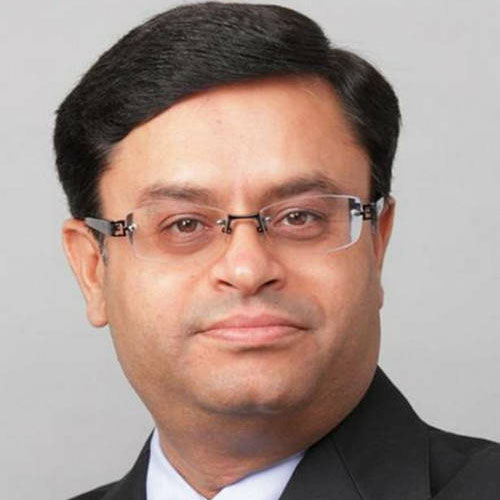
Arya: promote southern districts
According to C.S. Chandrakumar, chairman, CII Tamil Nadu, in the present scenario, the pandemic has hugely impacted the lives and livelihood of the people hence, the next focus should be on building large manufacturing hubs which will generate employment and also bring investment into the State. Tamil Nadu is already the leader in Automobile industry and it’s high time to start Medical Device and Pharma Manufacturing hub.
Defence Industrial Corridor in Tamil Nadu would attract more investment in defence manufacturing. CII is currently working on to come out with a feasibility report on the opportunities available for defence industries including MSMEs in the state. CII would urge the government to come up with new sector specific policies to promote growth of industries in the state, he feels.
CII will continue to work closely with the new government for the overall socio-economic development of the state and work hand-in-hand with the government on Covid initiatives, he further adds.
Satyakam Arya, vice-chairman, CII Tamil Nadu, wants the CII to work with the new government to promote southern districts in the state towards ensuring balanced regional development. Further, CII urge the new government to focus on skill development to prepare the younger generation of the state for the new age employment, imparting new and emerging technologies for various industry sectors. The government should create an environment conducive to bringing together academia, government and industry to conceptualise and bring new technologies like Industry 4.0, digitalisation, machine learning, additive manufacturing, etc.
CII seeks the government’s support to leverage the huge underemployed low cost labour available in the rural areas in tier II and III towns with the support of schemes offered by the government. It will be based on a hub-and-spoke model where the industry’s main unit will be the hub, while the unit at local/rural level will be the spoke. This can help create jobs and employment at the doorstep of the rural population. To promote development across state, sector-specific industry clusters could be created to focus on all aspects of creating a favorable ecosystem for industries to invest and do business, says Arya.
